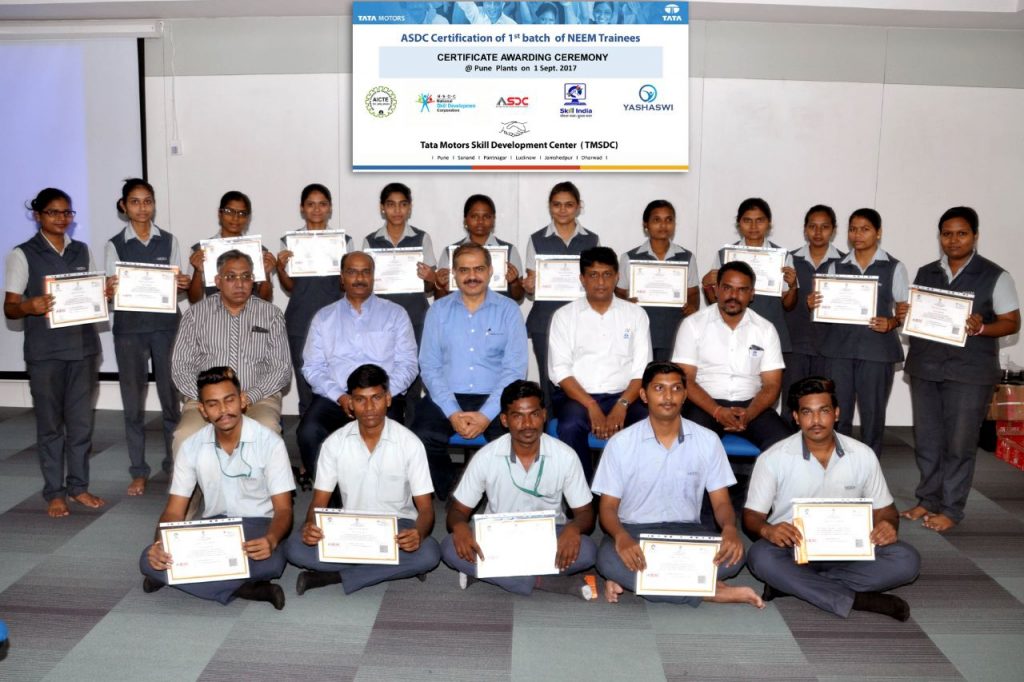The Company realises that the youth need to have the right skills to be able to take advantage of the large-scale employment opportunities in the automotive sector
Sowing the seeds of learning has long-term benefits, and Tata Motors foresees this as the foundation to prepare for future growth. As India is slated to become the third largest automotive market in the world by 2020, after China and the US, Tata Motors is aiming to train up to 40,000 people in the next three years in skills associated with the automobile industry.
The Company has organised training programmes in association with the Automotive Skill Development Council (ASDC) and the National Skill Development Corporation (NSDC). It has tied up with some more vocational training institutes with more than 4500 people under training currently as part of the programme.
Presently the fifth largest in the global automobile market, India is expected to grow tremendously. With the evolution in automobile manufacturing and service, the need for skilled workforce will also continue to increase exponentially. This means that the sector has a huge potential to generate large-scale employment opportunities. However, for the youth to be able to take up these opportunities, it is important they have the right skills.
With the evolution in automobile manufacturing and service, the need for skilled workforce will also continue to increase exponentially.

Gajendra Chandel, chief human resource officer, Tata Motors, says it is important for the business to not just focus on their own benefits but also take care of the entire ecosystem. “We may not need more than 10 per cent of these people, or even five to seven per cent. However, the industry at large needs this talent to drive the ecosystem efficiently,” he opines.
He further shares that India still has a low automotive base with the number of vehicles per 1000 people not being so significant at a mere 167 (Government of India data as per 2015). This implies that unlike other saturated markets in the developed countries, the industry in India is likely to grow for another 15–20 years at least. “Moreover, as the government is increasingly encouraging infrastructural development, the sector is further looking at significant growth in the coming times. The components industry is expanding exports and will certainly need more people going further,” Chandel elaborates.
The suppliers are an important part of the industry and as it continues to grow, they will need to expand operations and would need more skilled talent. However, they do not have the capability to build that talent. On the other hand, by taking up this skilling initiative Tata Motors has aligned its CSR agenda with a long-term business goal, not just for the benefit of the Company but the whole industry.
The trainees under the programme undergo classroom sessions combined with on-job training on the shop-floor for the first year, which is the basic course. Those who perform well in the first year move on to the second year for an intermediate training course and similarly for advanced training in the third year.
Talking of the courses, Chandel shares that although the existing education or vocational training setups offer subject knowledge, they lack applicability, which is why they had to take the initiative to ascertain the right skills to nurture future talent. With around 4500 students currently undergoing training across various plants of Tata Motors and the first pilot batch of 24 already having passed out with flying colours, Chandel says, “The Government has been tremendously supportive, flexible and helpful in terms of planning, designing and approving the courses.”
By developing talent for suppliers, Tata Motors has aligned its CSR agenda with a long-term business goal, not just for the benefit of the Company but the whole industry.
While on one hand automation is hitting the manufacturing-dominant industries, Chandel shares that the assembly lines in automobile will continue to need a lot of human skills, as much of it is difficult to automate. This also means that the industry will continue to need more people with dexterity. That said, this initiative is the best step forward to ensuring a smooth talent supply for future industry needs and Tata Motors further hopes to make the programme more scalable and qualitatively better in the coming years.
Tata Motors has also been conducting focussed initiatives, such as LEAP (Learn and Earn Programme) over the years. It has associated with 135 ITIs across 19 states for skill development. Additionally, Tata Motors’ full-term apprentice student, Aditya Pratap Rathore, represented India in the World Skills Competition, bringing back India’s first ever Medallion of Excellence for skills in ‘Automobile Technology’.



